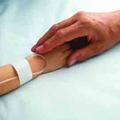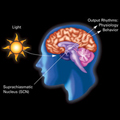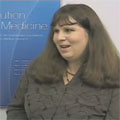
NIGMS supports all research featured in Biomedical Beat. Although only the lead scientists are named, coworkers and other collaborators also contributed to the findings.
Got research news to share? E-mail us at info@nigms.nih.gov.
|
Chand John and Eran Guendelman • Stanford University When we walk, muscles and nerves interact in intricate ways to let us take a step. This simulation, which is based on data from a 6-foot-tall man, shows what happens. More... Note: You may need to download the free Quicktime player to view the movie. |
Quick Links | ||
|
Predicting Sepsis Survival in Children A protein secreted during the body’s immune response to septic shock has been used to predict survival in children. More...
|
Sensing Slight Temperature Changes Researchers have found how fruit fly larvae detect single degree changes in their preferred range of temperatures. A similar process may exist in mammals. More... |
Circadian and Metabolic Proteins Linked A protein involved in our bodies’ ability to keep time is counterbalanced by a metabolic protein, suggesting that proper sleep and diet may help maintain their equilibrium. More... |
|






